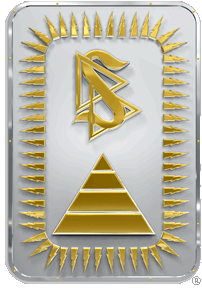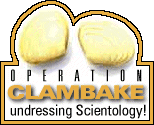
Xenu, also called Xemu, is a figure in the Church of Scientology's secret "Advanced Technology", a sacred and esoteric teaching. According to the "Technology", Xenu was the extraterrestrial ruler of a "Galactic Confederacy" who brought billions of his people to Earth in DC-8-like spacecraft 75 million years ago, stacked them around volcanoes, and killed them with hydrogen bombs. Official Scientology scriptures hold that the thetans of these aliens adhere to humans, causing spiritual harm.

There are a number of disputes concerning the Church of Scientology's attempts to suppress material critical of Scientology and the organization on the Internet, utilizing various methods – primarily lawsuits and legal threats, as well as front organizations. In late 1994, the organization began using various legal tactics to stop distribution of unpublished documents written by L. Ron Hubbard. The organization has often been accused of barratry through the filing of SLAPP suits. The organization's response is that its litigious nature is solely to protect its copyrighted works and the unpublished status of certain documents.
The Penet remailer was a pseudonymous remailer operated by Johan "Julf" Helsingius of Finland from 1993 to 1996. Its initial creation stemmed from an argument in a Finnish newsgroup over whether people should be required to tie their real name to their online communications. Julf believed that people should not—indeed, could not—be required to do so. In his own words:

The Church of Scientology has been involved in court disputes in several countries. In some cases, when the Church has initiated the dispute, questions have been raised as to its motives. The Church of Scientology says that its use of the legal system is necessary to protect its intellectual property and its right to freedom of religion. Critics say that most of the organization's legal claims are designed to harass those who criticize it and its manipulative business practices.

The Free Zone, Freezone, or more recently identified as Independent Scientology, comprises a variety of non-affiliated independent groups, organizations, and individuals who practice Scientology beliefs and techniques independently of the Church of Scientology (CoS). Such practitioners range from those who closely adhere to the original teachings of Scientology's founder, L. Ron Hubbard, to those who have adapted their practices far from CoS beliefs and practices.
The Fishman Affidavit is a set of court documents submitted by self-professed ex-Scientologist Steven Fishman in 1993 in the federal case, Church of Scientology International v. Fishman and Geertz (Case No. CV 91-6426.
The Moby Project is a collection of public-domain lexical resources created by Grady Ward. The resources were dedicated to the public domain, and are now mirrored at Project Gutenberg. As of 2007, it contains the largest free phonetic database, with 177,267 words and corresponding pronunciations.
Revolt in the Stars is a science fiction film screenplay written by Scientology founder L. Ron Hubbard in 1977. It tells the space opera story of how an evil galactic dictator, named Xenu, massacres many of his subjects by transporting them to Earth and killing them with atomic bombs. L. Ron Hubbard had already presented this story to his followers, as a true account of events that happened 75 million years ago, in a secret level of Scientology scripture called Operating Thetan, Level III. The screenplay was promoted around Hollywood circles in 1979, but attempts at fundraising and obtaining financing fell through, and the film was never made. Unofficial copies circulate on the Internet.
The Avatar Course, often simply called Avatar, is a series of LGAT self-development courses founded in 1986 by Harry Palmer and run by his privately held company, Star's Edge, Inc., which trains and licenses Avatar Masters (teachers) to deliver the Avatar Course globally.

The Religious Technology Center (RTC) is an American non-profit corporation that was founded in 1982 by the Church of Scientology to control and oversee the use of all of the trademarks, symbols and texts of Scientology and Dianetics. Although RTC controls their use, those works are owned by another corporation, the Church of Spiritual Technology which is doing business as L. Ron Hubbard Library, registered in Los Angeles County, California.

The Church of Scientology is a group of interconnected corporate entities and other organizations devoted to the practice, administration and dissemination of Scientology, which is variously defined as a cult, a business, or a new religious movement. The movement has been the subject of a number of controversies, and the Church of Scientology has been described by government inquiries, international parliamentary bodies, scholars, law lords, and numerous superior court judgements as both a dangerous cult and a manipulative profit-making business. In 1979, several executives of the organization were convicted and imprisoned for multiple offenses by a U.S. Federal Court. The Church of Scientology itself was convicted of fraud by a French court in 2009, a decision upheld by the supreme Court of Cassation in 2013. The German government classifies Scientology as an unconstitutional sect. In France, it has been classified as a dangerous cult. In some countries, it has attained legal recognition as a religion.

The Mind Benders was written by Cyril Vosper, a Scientologist of 14 years who had become disillusioned, Published in 1971 and reprinted in 1973, it was the first book on Scientology to be written by an ex-member and the first critical book on Scientology to be published. It describes the lower levels of Scientology and its philosophy in detail and also includes the story of Vosper's expulsion from the Church.
Scamizdat, a portmanteau of the words scam and samizdat, was the name coined by Grady Ward to a series of articles containing the writings of the Church of Scientology, both confidential and non-confidential, that were anonymously posted to the newsgroup alt.religion.scientology in 1995. Scamizdat was a major feature of the Scientology versus the Internet controversy, and the true identity of the person or persons responsible is still unknown.
Cryptography is the practice and study of encrypting information, or in other words, securing information from unauthorized access. There are many different cryptography laws in different nations. Some countries prohibit export of cryptography software and/or encryption algorithms or cryptoanalysis methods. Some countries require decryption keys to be recoverable in case of a police investigation.

FACTnet, also known as Fight Against Coercive Tactics Network, co-founded by Robert Penny and Lawrence Wollersheim, was a Colorado-based anti-cult organization with the stated aim of educating and facilitating communication about destructive mind control. Coercive tactics, or coercive psychological systems, are defined on their website as "unethical mind control such as brainwashing, thought reform, destructive persuasion and coercive persuasion".
In regards to copyright on religious works, it is not always clear who the rightsholder is. Under the provisions of the Berne Convention, copyright is granted to the author on the creation of the work. Several religions claim that all or some of their works were authored by their god or gods.

Operation Clambake, also referred to by its domain name, xenu.net, is a website and Norway-based non-profit organization, launched in 1996, founded by Andreas Heldal-Lund, that publishes criticism of the Church of Scientology. It is owned and maintained by Andreas Heldal-Lund, who has stated that he supports the rights of all people to practice Scientology or any religion. Operation Clambake has referred to the Church of Scientology as "a vicious and dangerous cult that masquerades as a religion". The website includes texts of petitions, news articles, exposés, and primary source documents. The site has been ranked as high as the second spot in Google searches for the term "Scientology".
The Electronic Frontier Foundation (EFF) is an international non-profit advocacy and legal organization based in the United States.

Religious Technology Center v. Netcom On-Line Communication Services, Inc., 907 F. Supp. 1361, is a U.S. district court case about whether the operator of a computer bulletin board service ("BBS") and Internet access provider that allows that BBS to reach the Internet should be liable for copyright infringement committed by a subscriber of the BBS. The plaintiff Religious Technology Center ("RTC") argued that defendant Netcom was directly, contributorily, and vicariously liable for copyright infringement. Netcom moved for summary judgment, disputing RTC's claims and raising a First Amendment argument and a fair use defense. The district court of the Northern District of California concluded that RTC's claims of direct and vicarious infringement failed, but genuine issues of fact precluded summary judgment on contributory liability and fair use.

Attempts, unofficially dubbed the "Crypto Wars", have been made by the United States (US) and allied governments to limit the public's and foreign nations' access to cryptography strong enough to thwart decryption by national intelligence agencies, especially the National Security Agency (NSA).









